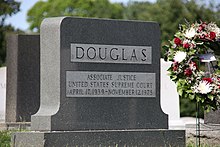William O. Douglas
William Orville Douglas (born October 16, 1898 in Maine , Minnesota , † January 19, 1980 in Bethesda , Maryland ) was an American lawyer and judge on the Supreme Court of the United States . After his appointment by Franklin D. Roosevelt on April 17, 1939, at a total of 36 years and seven months, he was the longest serving judge in the history of the Supreme Court. On December 31, 1974, he suffered a severe stroke in Nassau , Bahamas, from which he did not fully recover. The ongoing physical problems caused him to resign as a judge on November 12, 1975. He was succeeded by John Paul Stevens .
childhood
Douglas was born in Minnesota, but soon after moved with his family to Yakima , Washington , a small town about 200 km southeast of Seattle . His father, also named William, was a Presbyterian pastor. He died of a stroke when William was six years old. He is said not to have cared much for his son, which is later also claimed by William to his children. As a three-year-old William himself fell ill with a mysterious bowel disease that none of the doctors could cure. He survived this bad time, however, what his mother, Julia Bickford, considered a miracle of God and thus revered him as her treasure. She kept telling him that he could achieve anything in life, even to become President of the United States .
Career
Douglas received a scholarship from Whitman College in Washington and graduated in 1920. He then worked as a teacher for two years and then went to New York City to Columbia Law School . In 1923 he married for the first time (out of a total of four times). His wife, Mildred Riddle, also a teacher, had to keep him afloat at the time. He was a good student, but not an outstanding one in his year. Nevertheless, he graduated with flying colors. He got a job with Cravath, a predecessor of what is now Cravath, Swaine & Moore's law firm . After modest successes at Cravath and a period of unemployment, he started a short but all the steeper academic career at Columbia in 1927. As a follower of legal realism , which originated here, he quickly rose to assistant professor . The Yale University hired him soon after for the subject area. Douglas made friends there with the Dean Robert Maynard Hutchins. He soon became president of the University of Chicago and made Douglas an offer to teach in part there. This accepted and rose through the resulting double position to Sterling Professor at Yale. However, according to some sources, Douglas never taught in Chicago.
From 1934 Douglas was in government service. He was a director of the Protective Study Committee of the United States Securities and Exchange Commission , whose leadership he himself took over from 1936 as commissioner and a year later as chairman . He was then nominated by President Roosevelt as the successor to outgoing Judge Louis Brandeis at the Supreme Court. There he remained until his official change to senior status on November 12, 1975. In the course of the presidential election in 1948 , President Harry S. Truman offered him the democratic candidacy as vice-president . Douglas declined the offer, however, which Truman then successfully ran for election with Senator Alben W. Barkley .
He died in January 1980 and was buried in Arlington National Cemetery.
literature
- Bruce Allen Murphy: Wild Bill: The Legend and Life of William O. Douglas , Random House, Inc., New York, 2003.
Web links
- William O. Douglas in nndb (English)
- William O. Douglas in the Biographical Directory of Federal Judges
- Biography at Arlington National Cemetery
- Biography (English)
- Literature by and about William O. Douglas in the WorldCat bibliographic database
| personal data | |
|---|---|
| SURNAME | Douglas, William O. |
| ALTERNATIVE NAMES | Douglas, William Orville (full name) |
| BRIEF DESCRIPTION | American lawyer, US Supreme Court judge |
| DATE OF BIRTH | October 16, 1898 |
| PLACE OF BIRTH | Maine , Minnesota |
| DATE OF DEATH | January 19, 1980 |
| Place of death | Bethesda , Maryland |


